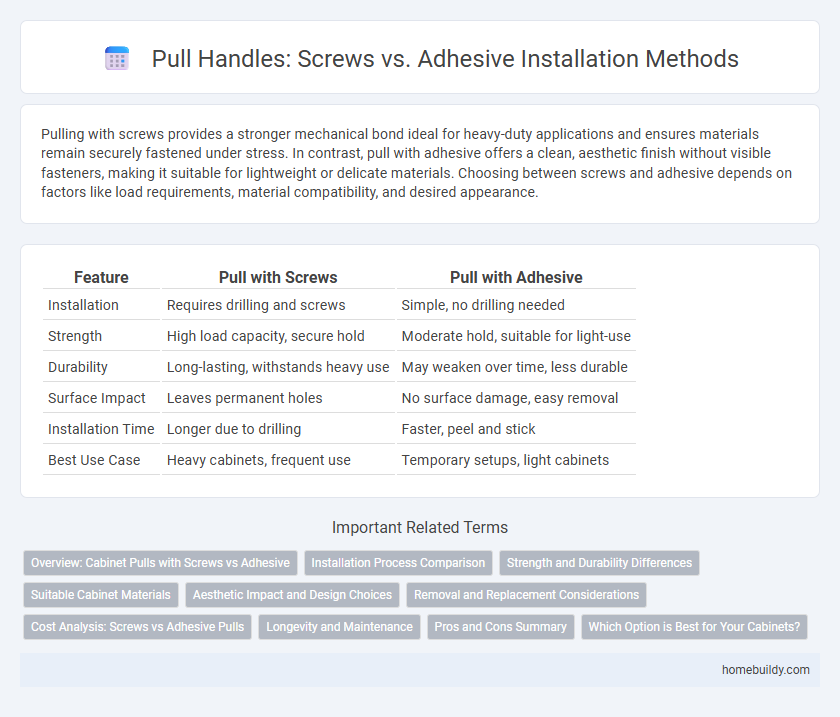Pulling with screws provides a stronger mechanical bond ideal for heavy-duty applications and ensures materials remain securely fastened under stress. In contrast, pull with adhesive offers a clean, aesthetic finish without visible fasteners, making it suitable for lightweight or delicate materials. Choosing between screws and adhesive depends on factors like load requirements, material compatibility, and desired appearance.
Table of Comparison
| Feature | Pull with Screws | Pull with Adhesive |
|---|---|---|
| Installation | Requires drilling and screws | Simple, no drilling needed |
| Strength | High load capacity, secure hold | Moderate hold, suitable for light-use |
| Durability | Long-lasting, withstands heavy use | May weaken over time, less durable |
| Surface Impact | Leaves permanent holes | No surface damage, easy removal |
| Installation Time | Longer due to drilling | Faster, peel and stick |
| Best Use Case | Heavy cabinets, frequent use | Temporary setups, light cabinets |
Overview: Cabinet Pulls with Screws vs Adhesive
Cabinet pulls installed with screws provide stronger, long-lasting durability and are suitable for heavy-use drawers and doors, ensuring secure attachment and resistance to frequent handling. Adhesive-mounted cabinet pulls offer a simpler, damage-free installation ideal for lightweight or decorative applications, but may lack the stability needed for daily heavy use. Choosing between screw-mounted and adhesive pulls depends on the cabinet material, expected wear, and the balance between permanence and ease of installation.
Installation Process Comparison
Cabinet pulls installed with screws require precise alignment and pilot holes to ensure secure fastening and long-term durability, often needing a drill and appropriate screw length for different cabinet thicknesses. In contrast, adhesive-mounted pulls offer a tool-free installation process, using industrial-strength glue for quick attachment, but may lack the stability and load-bearing capacity of screw-mounted pulls over time. Choosing between screws and adhesive depends on factors like cabinet material, pull usage frequency, and desired aesthetic without visible hardware.
Strength and Durability Differences
Cabinet pulls installed with screws provide superior strength and durability by securely anchoring the hardware to the cabinet surface, ensuring long-lasting performance under frequent use. Adhesive-mounted pulls may offer easier installation but generally lack the shear strength and resistance to repeated pulling forces, leading to potential detachment over time. For heavy-duty applications and sustained reliability, screw-mounted cabinet pulls remain the preferred choice.
Suitable Cabinet Materials
Cabinet pulls installed with screws provide a secure and durable attachment ideal for solid wood, plywood, and MDF cabinets, ensuring long-lasting strength and stability. Adhesive-backed pulls are better suited for smooth, non-porous surfaces like laminated or glass cabinets where drilling is undesirable or impossible. Choosing the correct mounting method based on cabinet material enhances pull longevity and prevents damage to the cabinet surface.
Aesthetic Impact and Design Choices
Cabinet pulls installed with screws offer a secure and durable attachment, allowing for consistent alignment and minimal movement, which enhances the overall aesthetic appeal of the cabinetry. In contrast, adhesive-mounted pulls provide a cleaner exterior with no visible hardware, ideal for minimalist or modern designs, but they may risk detachment over time, impacting long-term appearance. Choosing between screw-mounted and adhesive pulls involves balancing durability and maintenance needs against design preferences and the desired visual impact on cabinetry surfaces.
Removal and Replacement Considerations
Cabinet pulls installed with screws offer straightforward removal by unscrewing, minimizing damage to the cabinet surface and allowing easy replacement or repositioning. Adhesive-mounted pulls, while reducing drilling requirements, often cause surface damage or residue during removal, complicating replacement and risking cabinet finish integrity. Choosing screw-mounted pulls ensures durability and ease of maintenance, especially in frequent update or rental scenarios.
Cost Analysis: Screws vs Adhesive Pulls
Cabinet pulls installed with screws generally incur higher upfront labor costs due to the time and tools required for precise drilling and alignment. Adhesive pulls offer a cost-effective alternative by reducing installation time and eliminating the need for specialized hardware, though their durability may vary depending on adhesive quality and cabinet material. Evaluating the overall cost-effectiveness involves balancing the initial savings of adhesive pulls against potential future expenses from repair or replacement.
Longevity and Maintenance
Cabinet pulls secured with screws offer superior longevity due to their strong mechanical attachment, reducing the risk of loosening over time and allowing for easy maintenance or replacement. Adhesive-mounted pulls may provide a clean, damage-free installation but often lack the durability needed for frequent use, making them prone to detachment and requiring more frequent reapplication. Choosing screw-mounted pulls ensures consistent performance and minimal maintenance, particularly in high-traffic kitchen or bathroom environments.
Pros and Cons Summary
Cabinet pulls installed with screws offer robust durability and secure attachment, ensuring they withstand frequent use and heavy pulls without risk of detachment. Adhesive-mounted pulls provide a damage-free alternative suitable for rental properties or temporary setups but often lack long-term strength and can fail under significant stress. Choosing between screw-mounted and adhesive pulls depends on the desired balance between installation permanence and surface preservation.
Which Option is Best for Your Cabinets?
Cabinet pulls installed with screws provide a secure, long-lasting hold that withstands frequent use and heavy drawer content, making them ideal for high-traffic areas. Adhesive-mounted pulls offer a quick, damage-free installation suitable for lightweight drawers or temporary cabinetry but may weaken over time and with moisture exposure. Evaluating your cabinet material, usage frequency, and durability needs will determine whether screw-mounted or adhesive pulls are the best option for your cabinetry.
pull with screws vs pull with adhesive Infographic

 homebuildy.com
homebuildy.com